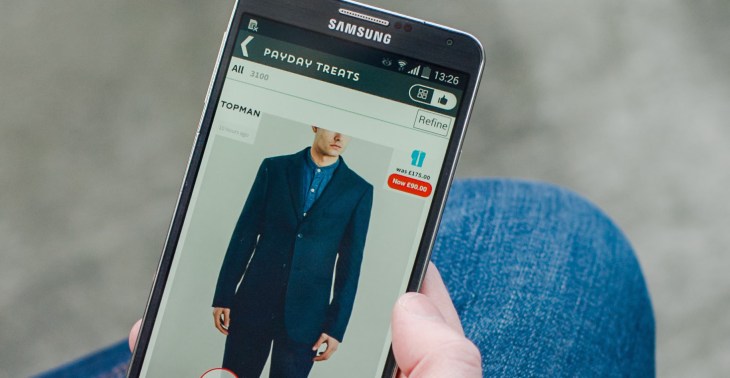Personalised shopping app and U.K. startup Mallzee has raised new funding. The so-called ‘Tinder of fashion’ — in reference to its Tinder-esque UI that invites you to swipe right if you like and swipe left if you don’t as you shop for clothes through its mobile app — has swiped £2.5 million in additional investment.
Backers this time around include the Royal Mail Group, who have led the round, alongside a number of new and existing investors. They include the Scottish Investment Bank, Par Equity, and individual investors Gareth Williams (Skyscanner), Rob Dobson (Actix), and Chris Van Der Kuyl and Paddy Burns (4j Studios, the makers of Minecraft console). The company has raised a total of £3.1 million since being founded in 2013.
Available for Android and iOS, Mallzee lets you browse (and ultimately purchase) fashion items from over 100 retailers via its swipe interface, However, aside from the now common Tinder-esque UI (or ‘Tinderface’), it’s the startup’s personalisation technology and retailer analytics that appears to be the biggest draw here.
The former creates what the startup describes as unique personalised style profiles that makes finding “the perfect outfit” quick and easy. This includes sending you alerts when items you have swiped-to-like are reduced in price.
For the retailers it works with, Mallzee provides a data insight tool, which claims to provide “actionable real-time knowledge” of how their products are being perceived and engaged with across various consumer demographics, such as based on location, age and gender. That data is aggregated and anonymous, of course.
Noteworthy, when the startup announced a £500,000 seed round in May 2014, CEO and founder Cally Russell reckoned the funding would enable Mallzee to get to 500,000 users by early 2015. “Based on current numbers we think this is more than achievable,” he told TechCrunch at the time.
That hasn’t quite happened, with the app hitting just under 300,000 users to date, but the Edinburgh, Scotland-based company still predicting it will reach 1 million by the end of this year.
